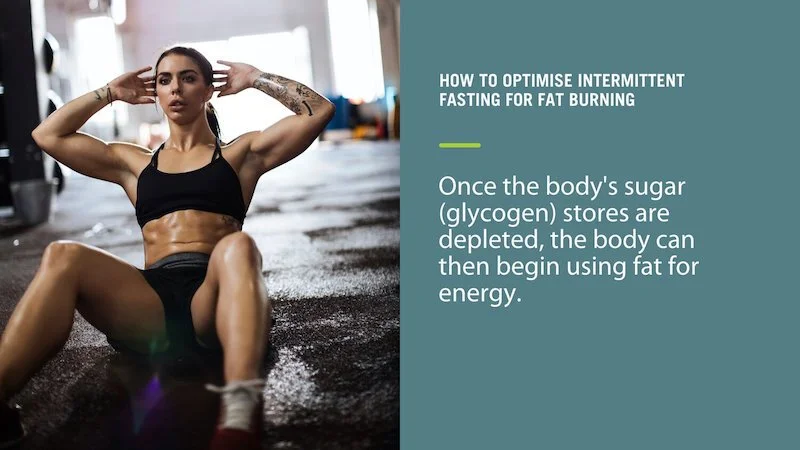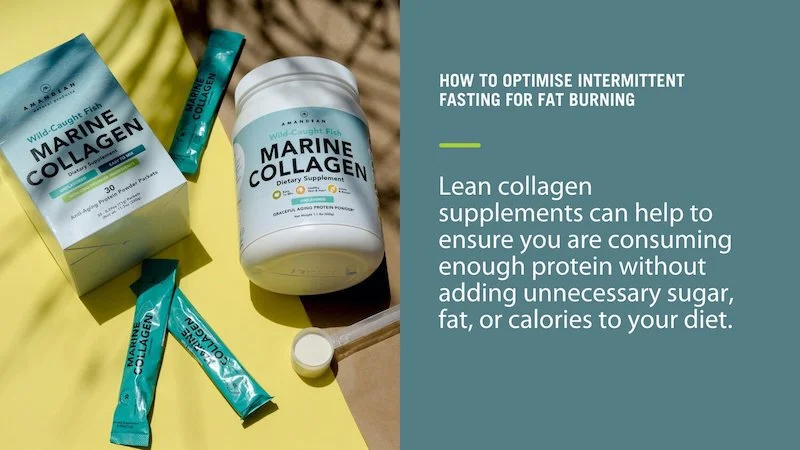How to Optimise Intermittent Fasting for Fat Burning
By Martin Ebner
Intermittent fasting (IF) has gotten so much hype in recent years that I think people are now becoming skeptical. One of the many benefits of intermittent fasting is weight loss, but it isn't some fad diet with sketchy science. Actually, it isn't a diet at all! Intermittent fasting is an eating pattern that breaks the three-meal-a-day status quo and frees our bodies from the burden of non-stop digestion so that they can focus on other tasks, one of which is to burn fat in between meals.
When we say weight loss, what we're really aiming for is fat loss. Generally, we care more about toning and “slimming down” our waistlines than seeing a smaller number on the scale. That's why intermittent fasting has become so popular; studies have found that intermittent fasting for 24 weeks can reduce stubborn belly fat and shrink waist circumference by as much as 4-7%. Without further ado, here are some tricks to optimize an intermittent fast to burn body fat.
Intermittent Fasting: The Basics
Intermittent fasting is basically an eating schedule that tells you when to eat, not what to eat. There are many different intermittent fasting plans or eating schedules, but they all rotate between fasting periods and eating periods. For instance, the 16:8 method is a 16-hour window of fasting followed by an eight-hour eating window. This method is typically the easiest to follow and only requires that you skip breakfast and take a late lunch. There are also 24-hour fasts that you can do on certain days of the week (AKA the eat stop eat method) and alternate-day fasting in which you fast one day, and eat normally the next day.
There are three main explanations for how intermittent fasting works.
Our bodies are hardwired for intermittent fasting. Snacking has not always been an option. Our hunter-gatherer ancestors didn't have an abundance of food just waiting for them at the first stomach rumble. Depending on how successful their hunts went, they might go hours or even a few days between their last meal and the next. Due to our modern eating patterns, we might start to panic after going a couple of hours without food, but our bodies actually thrive on it. Overeating has become part of the norm for many cultures by separating large meals with frequent snacking. Our biology tells us that this was not what we were programmed to do!
When we go extended periods of time without food, the body begins to use the sugars we consume as its primary source of energy. Once these sugar (glycogen) stores are depleted, the body can then begin using fat for energy. This is the stage we want to maximize.
Ultimately, intermittent fasting isn't a diet plan, but it is a form of calorie restriction. Consuming fewer calories than you burn is the key to losing weight and burning fat.
The Health Benefits of Intermittent Fasting
Intermittent fasting didn't gain the notoriety that it has today by simply lowering a number on a scale. There are many different ways in which fasting can improve your overall health and wellness.
Lower your risk of type 2 diabetes
We're beginning to learn more about intermittent fasting's influence on the hormone insulin. Intermittent fasting can improve insulin sensitivity, lower blood sugar levels, and reduce the risk of obesity, all things that increase one's risk of type 2 diabetes. Even when compared to daily caloric-restrictive dieting, IF has been shown to lower fasting blood glucose and insulin levels in people with prediabetes.
May improve heart health
Preliminary studies show that intermittent fasting may help to reduce many risk factors of heart disease including blood pressure, blood sugar, inflammation, and cholesterol. All of which may contribute to heart disease prevention.
May extend lifespan
Who wants to pass up a longer lifespan? One of the most promising and exciting benefits of intermittent fasting is that it may help us to live longer lives! Animal studies have shown that fasting can extend the lifespan of fruit flies, mice, and rats by up to 83%. Considering that cardiovascular diseases are the number 1 cause of death globally, it makes sense why so many people believe IF to be a powerful anti-aging tool.
Related Article: How to stay lean as you age
Promotes weight loss
As mentioned above, IF can help to lower body weight via improved metabolic health, the release of certain hormones, and reducing the number of calories consumed in a day. A recent review of IF literature found that fasting may increase weight loss by 3–8% in just 3–24 weeks. However, dietitians warn that people who have had eating disorders in the past should avoid intermittent fasting.
Burn fat
Now for the moment we've all been waiting for, intermittent fasting is a great way to burn extra fat. There are multiple mechanisms in place that make IF such a great method of fat burning. First, when we are in a fasted state, our insulin levels drop and glycogen stores become depleted, which aids in fat burning. Simultaneously, blood levels of human growth hormone (HGH) can increase, contributing to increased muscle mass and fat burning. The same study that showed that IF can result in 3-8% weight loss also found that the study participants lost 4–7% of their waist circumference (visceral fat) after 6–24 weeks of fasting.
How to Optimise Fasting for Fat Burning
IF is a great choice for anyone who's looking to safely lose weight, burn fat, and improve their results in the gym. If you want to make the most out of your fast and burn as much fat as possible, here are some things you can do:
Try a low-carb diet
Though one of the beautiful things about IF is that it isn't a restrictive diet, what you eat to break your fast matters. High-fat low-carb diets like the ketogenic diet help to make fat more accessible for your body to use as energy. Instead of eating large amounts of carbohydrates which are stored as glycogen, eating healthy fats (MCT oil, olive oil, avocados, etc.) means glycogen levels will be lower, thus the barrier to fat stores is lower as well. Avoid sugary, processed, carb-heavy foods and switch to lean proteins, whole grains, and healthy fats instead. About 40% of calories should come from fat, 40% from protein, and 20 % from carbs.
Use a collagen supplement for lean protein
If you’re tired of eating chicken breast for dinner every day, collagen supplements may be able to help. Collagen is the most abundant protein in the human body. Lean collagen supplements can help to ensure you are consuming enough protein without adding unnecessary sugar, fat, or calories to your diet. My go-to collagen supplement is Amandean Marine Collagen. It is totally flavorless, odorless, GMO-free, and has only ~35 calories per 10g scoop. Their collagen supplements are unmatched in bioavailability, meaning you get more bang for your buck. Additionally, because they are both hot and cold soluble, it makes it easy to add a scoop of collagen to black coffee or water during fasting periods to help you feel fuller and more energized throughout the day. You don’t need to worry about shoving a giant plastic container into your gym or work bag either because they come in single-serve packets that can fit in your pocket!
GET 10% OFF YOUR ORDER WITH CODE: EBYLIFE10
Work out during eating days/windows
Working out in a fasted state is rarely beneficial for strength training. This is because muscle-building exercises like weight training rely on carbs for energy. Similarly, there have not been many notable benefits of doing cardio during a fasted state. Since many of the benefits of intermittent fasting are noticed after 3-6 weeks, you should align your fasting schedule with your workout plan in order to consistently get to the gym and maximize fat burning.
Consider taking a fat-burner before workouts
While they’re certainly not magic pills, fat-burners may give your workouts the fat-burning edge you're looking for.
See: The 5 best stimulant-free fat burners for men and women
Make sure your exercises are maximized for fat burning
When it comes to fat-burning (as opposed to weight loss or muscle building) not all exercises or workouts are created equally. Some of the best fat-burning exercises are HIIT, resistance training, and moderate-intensity cardio like prolonged inclined walking. Choose these exercises over weight lifting to get the most out of your energy and prioritize fat burning above all else! Try to do them 3-4 times a week with partially fasted rest days in between.



